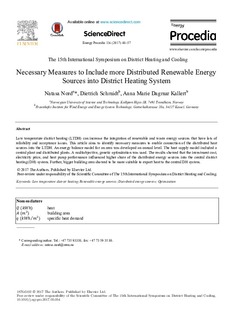| dc.contributor.author | Nord, Natasa | |
| dc.contributor.author | Schmidt, Dietrich | |
| dc.contributor.author | Kallert, Anna Marie Dagmar | |
| dc.date.accessioned | 2019-03-05T13:58:13Z | |
| dc.date.available | 2019-03-05T13:58:13Z | |
| dc.date.created | 2017-11-14T09:48:03Z | |
| dc.date.issued | 2017 | |
| dc.identifier.citation | Energy Procedia. 2017, 116 48-57. | nb_NO |
| dc.identifier.issn | 1876-6102 | |
| dc.identifier.uri | http://hdl.handle.net/11250/2588822 | |
| dc.description.abstract | Low temperature district heating (LTDH) can increase the integration of renewable and waste energy sources that have lots of reliability and acceptance issues. This article aims to identify necessary measures to enable connection of the distributed heat sources into the LTDH. An energy balance model for an area was developed on annual level. The heat supply model included a central plant and distributed plants. A multiobjective, genetic optimization was used. The results showed that the investment cost, electricity price, and heat pump performance influenced higher share of the distributed energy sources into the central district heating (DH) system. Further, bigger building area showed to be more suitable to export heat to the central DH system. | nb_NO |
| dc.language.iso | eng | nb_NO |
| dc.publisher | Elsevier | nb_NO |
| dc.title | Necessary Measures to Include more Distributed Renewable Energy Sources into District Heating System | nb_NO |
| dc.type | Journal article | nb_NO |
| dc.type | Peer reviewed | nb_NO |
| dc.description.version | publishedVersion | nb_NO |
| dc.source.pagenumber | 48-57 | nb_NO |
| dc.source.volume | 116 | nb_NO |
| dc.source.journal | Energy Procedia | nb_NO |
| dc.identifier.doi | 10.1016/j.egypro.2017.05.054 | |
| dc.identifier.cristin | 1513775 | |
| dc.description.localcode | © 2017 The Author(s). Published by Elsevier Ltd. Under a Creative Commons license https://creativecommons.org/licenses/by-nc-nd/4.0/ | nb_NO |
| cristin.unitcode | 194,64,25,0 | |
| cristin.unitname | Institutt for energi- og prosessteknikk | |
| cristin.ispublished | true | |
| cristin.fulltext | postprint | |
| cristin.qualitycode | 0 | |
